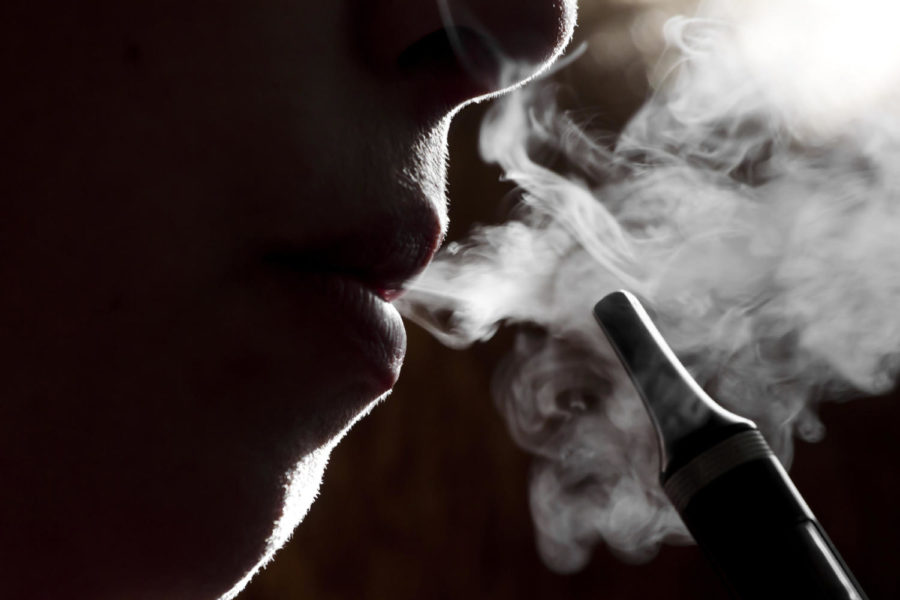- News
- News / Politics And Administration
- News / Politics And Administration / Campus
- News / Student Life
New policy bans e-cigarettes from campus
January 9, 2016
Students will have to leave behind their vaporizers as they return to campus for spring semester because a new policy put in place on the first of the year.
Because of a resolution to Smoke-Free Campus, Iowa State University officially banned electronic cigarettes on all campus property, which went into effect Jan. 1.
The policy was passed by Iowa State’s Faculty Senate in December, 2015, and is in compliance to the campus’ current rules on tobacco smoking.
The policy aligns with the state of Iowa’s Smokefree Air Act passed in 2008 by state legislators that “protects employees and the general public” by banning smoking in nearly all public spaces and in places of employment.
Iowa State’s Smoke-Free Campus states “smoking is prohibited in ‘public buildings and vehicles owned, leased, or operated by or under the control of’ the university as well as on the entire ‘grounds of the university.’”
Therefore, a person may not smoke any kind of cigarette — whether electronic or traditional — in any building on and off campus, or any outdoor space owned by the university, including Veenker Golf Course and ISU Farms.
The only exception to the rule allows smoking in enclosed areas if it is relevant to medical or scientific research.
However, this does not include Campustown.
“[The policy] does not include Campustown,” said Peter Englin, the director of residence for the Department of Residence. “But it includes properties that we lease in Campustown, like Legacy Tower.”
Englin said although the science surrounding these devices are relatively new and varying, DOR is supportive of having the ban in place.
For some, this new restriction is a cause for celebration, including Denise Denton, senior lecturer in kinesiology.
Denton said ISU students had been active in getting the conversation started at the university, particularly the Health Promotion Club, a student organization for which Denton advises.
The Health Promotion Club brought the issue forward to Student Government, which supported the restriction of electronic cigarettes in a recommendation to university administration passed on Feb. 4, 2015.
After concerns from students, DOR also became involved with the issue.
Englin said his department had been involved with the ongoing discussion and provided feedback on the issue.
“At the beginning of the academic year, we had a couple of instances where smoke alarms were set off in people’s rooms due to an e-cigarette or vape,” Englin said. “So it was more of a nuisance than anything else, but that does empty the building.”
Doris Hodgson is the owner of Vape On, a local Ames business that sells electronic cigarette paraphernalia and other products. She said she was not supportive of the university’s new policy because she believes an e-cigarette is a better alternative to a tobacco cigarette.
“It’s a better alternative,” she said. “Cigarettes have about 400 chemicals in them and you’re getting rid of all that when you vape.”
A past smoker herself, Hodgson said after making the switch, she found that her lungs are clearer and there was a decrease in her coughing and the smell.
Hodgson said she has a small number of ISU student customers, and does not believe this new policy will affect her business.
However, for those like Denton, they support the resolution because of a rising number of studies that state that e-cigarettes, even without nicotine, are harmful to an individual’s health.
According to a statement released by the American Lung Association, the organization “is concerned about the potential health consequences of electronic cigarettes, as well as the unproven claims that they can be used to help smokers quit.”
Before the ban reached campus, however, legislation passed by the Story County Board of Supervisors in July that barred electronic cigarette usage on all county property, except public parks.
Denton said the Health Promotion Club conducted a survey in 2014 of nearly 600 Ames community members to study public opinion and usage of electronic cigarettes. The results presented to the Board of Supervisors stated an overall majority had an unfavorable impression of e-cigarettes or vaping devices.
Now, Denton said the Health Promotion Club is working on its next goal: ban usage in all public spaces in Ames.
Denton said passing this restriction is important public health for the students because it helps stop this behavior.
“No law guarantees someone does or does not do something, but it sets a bar in an operation,” Denton said. “It’s expectations with teeth.”
Denton also argued that making a practice equal means there is a cultural approval associated with the issue. For example, she said, since marijuana is legalized in some states there has been an increase in usage across the board.
Hodgson, who plans to be a part of the conversation to prevent banning e-cigarettes and vapors in Ames, said it should be up to local business owners.
“I feel that it should be the business owner’s decision,” Hodgson said. “I do think that the business owners should have a say on whether they can vape in their establishment.”
To report a complaint or to raise concerns, students, faculty or staff can contact the ISU Department of Public Safety by visiting police.iastate.edu or by calling 515-294-4428.

















